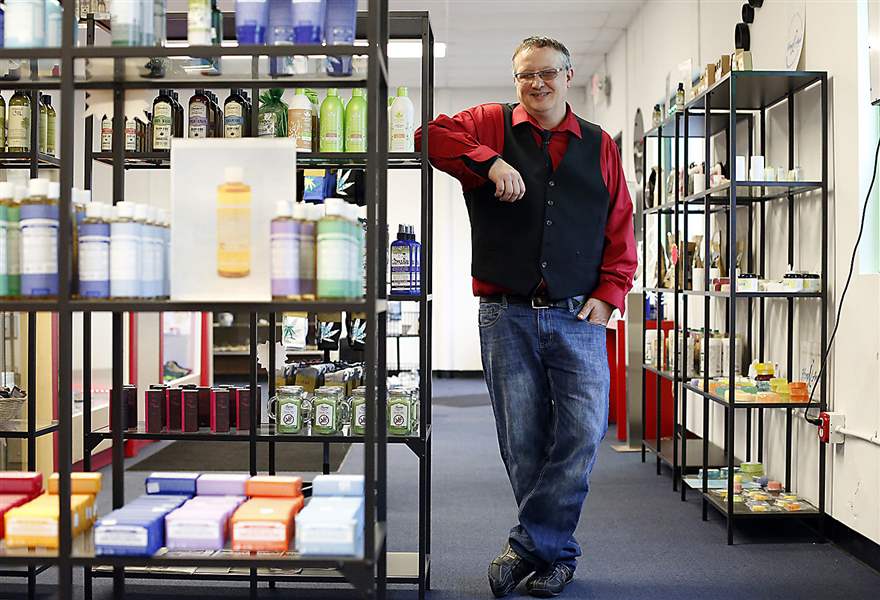
DIFFERENT AIMS, TOUGH RULES CITED
Local hemp merchant won’t seek medical marijuana license
4/3/2017

Kevin Spitler, owner of Toledo Hemp Center, is not seeking a license to dispense medical marijuana because of the heavy regulations involved in Ohio’s law. He says he’s worked to keep his business distinct from the marijuana culture.
THE BLADE/AMY E. VOIGT
Buy This Image
As the likely costs and regulations of starting up an Ohio medical marijuana dispensary come into focus, one local — and experienced — medical marijuana purveyor is keeping his distance, for now.
Kevin Spitler, owner of Toledo Hemp Center, at 815 Phillips Ave., said he’s glad to see the law being implemented but doesn’t see himself as one of the licensed vendors.
“The list of requirements is huge. There’s no way I can come up with the funding. I’ve got everything I have into this,” Mr. Spitler said of his business selling products made from hemp, which comes from the marijuana plant, but doesn’t have the plant’s psychotropic properties.
Regarding a potential dispensary, he said, “I haven’t explored it extensively. I would have to sit down with a potential business partner.”
IN PICTURES: Toledo Hemp Center
Gov. John Kasich in 2016 signed a law making Ohio the 26th state with medical marijuana. The law does not permit smoking marijuana or home-growing. That means using it in edible, oil, vapor, patch, tincture, and plant matter form.
The regulations for the grow operations and the dispensary operations are being developed by separate state agencies, with goals of allowing implementation of the law in October, 2018.
In the meantime, patients with one of 20 debilitating diseases or conditions contained in the law will be able to go to Michigan or some other state that already has a medical marijuana system and legally obtain pot to bring back to Ohio.
A Toledo native, Mr. Spitler ran a medical marijuana dispensary near Kalamazoo for three years before his store was ordered to close because of a change in Michigan law.
Now he sells hemp products — oils, pills, lotions, and edibles made with cannabinoids extracted from hemp. He has loyal, repeat customers who say his cannabis-based products bring them relief without the need for narcotics.
Mr. Spitler said he’s worked to to keep his business distinct from the marijuana culture and feels his older clientele might feel uncomfortable with the under-40 folks showing up to buy medical marijuana, even if it can’t be smoked.
“They don’t want to get high. It’s two different clienteles,” Mr. Spitler said. “Why should I create an uncomfortable zone when I created that comfort zone for them?”
Mr. Spitler said he returned in 2013 intending to help promote marijuana legalization in Ohio.
“I had every intention of opening [a medical marijuana dispensary] when I first came here. Then I saw something different.
“Now that I’ve been at it three years, it’s a different mindset,” Mr. Spitler said. “What we’re doing in Toledo now is we’re creating an acceptance thing. There’s more to it than just getting high. I think Toledo can be a model for how it should be done.”
Mr. Spitler, 43, was working for the now-defunct Textileather factory when he suffered an on-the-job injury more than a decade ago. He was walking past a paper-reeling machine that suddenly threw off a bolt of static electricity that knocked Mr. Spitler across the room.
“It threw me like a rag doll,” he said.
Physicians had him on pills to counter his physical pain and post-traumatic stress disorder that had him terrorized of anything electrical, from outlets to lightning.
“I felt like a freakin’ zombie. I took it upon myself to help myself,” he said. “The only way I knew how to do it was smoke it.”
Mr. Spitler moved to Allegan, Mich., to take advantage of the medical marijuana law. He opened a medical marijuana dispensary in Oshtemo Township and says he went out of his way to operate above-board.
The dispensary operated from 2010 to 2013, when he was shut down after a court case in Michigan allowed municipalities to deem any medical marijuana dispensary as a public nuisance.
He moved back to Toledo in part because his mother was dying from cancer and he wanted to help her. He introduced her to cannabis and believes that it prolonged her life.
The day his mother died in 2013, he had to give a speech at a medical marijuana expo. It was there he met a proponent of legal hemp products, he said. He opened the Toledo Hemp Center a month later.
“I had no way of helping other moms. If I did it with the marijuana products, I’d be in jail,” Mr. Spitler said.
Now he continues to promote his cannabis-related products, and has a television ad that portrays older people using his products.
He said he’s not as confident now that inhaling burned marijuana has the medical benefits of hemp.
The requirements to operate a dispensary are still being formulated by the Ohio Board of Pharmacy. They require the applicant to prove that he or she owns or leases the property for the dispensary, provide a detailed list of owners and officers of the business, and to have a record of paying taxes.
The applicant also has to show that he or she has enough money to operate for a year without income, but at least $250,000. The application fee is $5,000 and the annual renewal fee is $70,000.
It also asks for the criminal background of applicants, any previous experience in medical marijuana, and a detailed description of the proposed facility and its security arrangements.
The state plans to approve up to 60 licenses for dispensaries by Sept. 8, 2018. It can issue more licenses if there is enough need. The rules must be finalized on or before Sept. 8.
Contact Tom Troy: tomtroy@theblade.com or 419-724-6058 or on Twitter @TomFTroy.